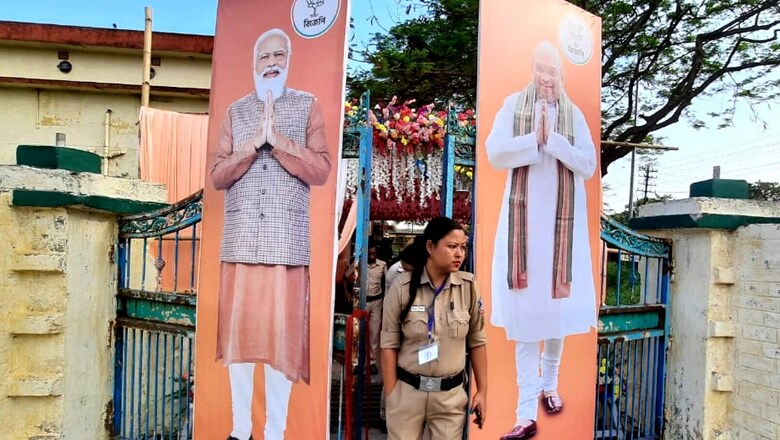
views
Around three years after its passage in Parliament, Union Home Minister Amit Shah has said the Citizenship Amendment Act (CAA) will be implemented in the country once the Covid-19 wave is over.
Amit Shah, who steered the passage of the CAA which promises citizenship to non-Muslim minorities who came from neighbouring countries between March 24, 1971 and December 31, 2014, made the announcement during his first visit to West Bengal since the Assembly elections last year that brought Mamata Banerjee’s Trinamool Congress (TMC) back for a third consecutive term.
“The TMC is spreading rumours that CAA will not be implemented. I want to clearly say that the CAA would be implemented as soon as the corona wave ends,” Shah said on Thursday.
The Union Home Minister has previously too linked the implementation of the CAA to the Covid-19 situation. In an exclusive interview to Network18 Group Editor-in-Chief Rahul Joshi in February this year, Shah had said: “As long as we are not free from Covid-19, this can’t be a priority. We have seen three waves. Thankfully, things are getting better… The decision is linked to the Covid situation. But there is no question of going back on it. The question does not arise.”
Shah’s announcement in Bengal came a month after it was reported that the ministry had sought another six months to frame CAA rules, the fifth extension sought by the MHA from the subordinate committee on parliamentary legislation of the Lok Sabha and the Rajya Sabha.
Here’s a refresher on what the Citizenship Amendment Act envisages, the opposition to it and the government’s counter to its criticism.
What is Citizenship Amendment Act, 2019?
The Act amends the Citizenship Act of 1955 to effectively grant Indian citizenship to non-Muslim refugees from Pakistan, Bangladesh and Afghanistan. They will be given Indian citizenship after residing in the country for five years, instead of 11 years.
The legislation is aimed to benefit those were “forced or compelled to seek shelter in India due to persecution on the grounds of religion” and aims to protect such people from the legal ramifications of illegal migration. The cut-off date is December 31, 2014, implying that applicants must have entered India on or before the date.
How is CAA Linked to NRC?
The National Register of Citizens (NRC) is a register maintained by the Union government that effectively lists Indian citizens in Assam, and weeds out ‘infiltrators’. The register was first made for Assam, but in 2019, the Centre said it would be extended to the entire country.
The final NRC list published on August 31, 2019 had led to controversy after opposition parties alleged that many genuine citizens, in particular Bengali Hindus, had been left out. The BJP, which has been trying for a breakthrough in Bengal, has since argued in the state that the CAA will ensure no Bengali Hindu is left out.
Objection to CAA
Protesters and opposition parties say the Act isn’t consistent in safeguarding all religious minorities, nor does it extend to all of India’s neighbouring countries. They say it leaves out Rohingya Muslims and Hindus who face persecution in Myanmar, minority Muslim sects in Pakistan, and Christian Tamils in Sri Lanka.
The passage of the Citizenship Amendment Bill in Parliament in 2019 was met with protests in parts of the country and college campuses in several cities. A protest led by women in the Shaheen Bagh locality of Delhi came to be identified as the face of the objection to the legislation. The protests against CAA took a violent turn in February 2020 when communal riots broke out in north east Delhi.
Govt’s Counter
The government has described the CAA as an inherently “humanitarian” one, arguing that it will aid minorities trying to escape religious persecution in Muslim-majority nations.
In an interview to Network18 back in 2019, Union Home Minister Amit Shah had explained the Narendra Modi government’s stand to offer citizenship to only Hindus, Christians, Buddhists and Jains, but not Muslims.
“The reason is if minorities from Afghanistan, Pakistan and Bangladesh come here to save their lives, they are refugees and not illegal immigrants. If someone comes here to earn livelihood or to disrupt law and order, then they are intruders,” Shah had said.
Clarifying that he did not mean that Muslims are intruders, Shah added: “It is not possible for them to be religiously persecuted…”
Delay in Implementation
The MHA in April sought a sixth extension to frame the rules for CAA without which the legislation cannot be implemented. The ministry wrote to the subordinate committee on parliamentary legislation seeking six months till October to frame the rules.
The CAA was passed by Parliament amid opposition protests on December 11, 2019 and received Presidential assent the following day. According to the Manual on Parliamentary Work, the rules for any legislation should have been framed within six months of presidential assent or seek extension from the Committees on Subordinate Legislation, Lok Sabha and Rajya Sabha.
Since, the MHA could not frame rules within six months of the enactment of the CAA, it sought time from the committees — first in June 2020 and then four more times.
The central government has already made it clear that the Indian citizenship to the eligible beneficiaries of the CAA will be given only after rules under the legislation are notified.
Read all the Latest India News here




















Comments
0 comment